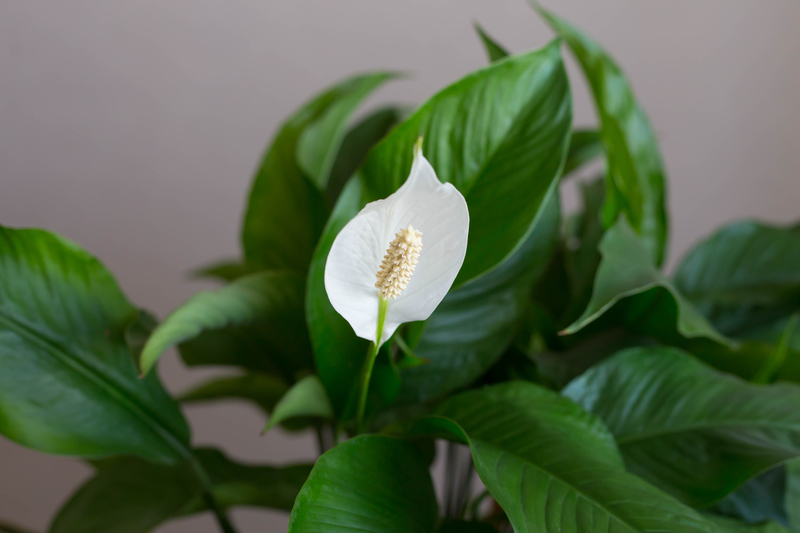Streamline Your Gardening Efforts with Three Weed Control Tips
Posted on 01/06/2025
Streamline Your Gardening Efforts with Three Weed Control Tips
Gardening is a rewarding and relaxing hobby but can quickly become overwhelming when you're constantly battling unwanted weeds. Streamline your gardening efforts with smart weed management techniques that save you time and energy, and help your plants thrive. In this comprehensive guide, you'll discover three essential weed control tips to make your outdoor spaces healthy, beautiful, and low-maintenance.

Why Effective Weed Control is Essential
Weeds are more than just unsightly--they compete with your flowers, vegetables, and shrubs for vital resources like water, nutrients, and sunlight. Ignoring weed problems can lead to reduced garden productivity and affect the health of your plants. By implementing smart weed management methods, you'll not only beautify your garden but also create a stronger, more resilient ecosystem.
Common Challenges Gardener's Face with Weed Control
- Rapid growth: Weeds can emerge and spread faster than cultivated plants.
- Competition: Each weed robs your plants of nutrients, moisture, and sunlight.
- Labor-intensive: Manual weeding is time-consuming and often leaves behind roots that resprout.
- Chemical concerns: Many gardeners hesitate to use harsh herbicides due to environmental and health risks.
To streamline your weed control process, consider natural and practical solutions that integrate into your regular gardening routine. Here are three proven weed control techniques that will save you time and minimize frustration.
Tip 1: Mulching -- Nature's Weed Blocker
How Mulching Simplifies Weed Management
One of the most effective and eco-friendly ways to control garden weeds is to apply mulch. A thick layer of mulch acts as a physical barrier, blocking sunlight and preventing weed seeds from germinating. Mulching also helps conserve moisture, moderate soil temperature, and improve soil health as organic materials break down.
Types of Mulch for Weed Control
- Organic mulches: Straw, wood chips, bark, grass clippings, and compost are excellent choices for vegetable gardens and flower beds. These materials enrich the soil as they decompose.
- Inorganic mulches: Landscape fabric, gravel, or black plastic sheeting work well in pathways or perennial beds where you want long-lasting weed barriers.
How to Apply Mulch Effectively
- Weed your garden thoroughly before applying mulch to avoid trapping existing weeds underneath.
- Spread mulch 2-4 inches deep around plants, allowing a few inches of space around stems to prevent rot.
- Replenish mulch as needed, especially organic types, to maintain consistent coverage and weed suppression.
Tip: Use cardboard or newspaper as an underlayer before adding organic mulch for an extra barrier against persistent weeds.
Tip 2: Smart Planting Strategies for Weed Suppression
Plant Densely to Crowd Out Weeds
Dense planting not only creates a lush, attractive garden but also reduces the open space available for weed seeds to take root. By using ground covers, tightly spaced perennials, or low-growing shrubs, you naturally suppress new weeds from emerging.
- Creeping thyme, sedum, or clover work well as living mulch in ornamental beds.
- Vegetable gardeners can interplant quick-growing crops like radishes, lettuce, or peas to shade the soil before weeds germinate.
Choose Weed-Resistant Plant Varieties
Select vigorous, low-maintenance plants that can tolerate some weed competition and quickly establish themselves. Native species are particularly effective, as they tend to outcompete invasive weeds and require less care.
- Use sprawling plants such as nasturtiums or sweet potatoes in vegetable beds to create ground cover.
- Mix ornamental grasses like muhly grass or blue fescue into landscapes for year-round weed suppression.
Rotate Crops for a Weed-Free Garden
Crop rotation is not just for large-scale farms--it also benefits home gardens by disrupting weed life cycles and reducing pest problems. By changing where you plant certain crops each year, you create less favorable conditions for weeds that prefer specific plants or soil conditions.
Tip 3: Proactive and Targeted Weed Removal
The Best Time to Weed
Timing is everything in garden weed control. Weeds are easiest to remove when they're young and before they set seed. Set aside a few minutes each week for routine weeding, and you'll avoid larger, more difficult tasks later in the season.
- After rain -- Soil is soft, making it easier to pull weeds up by the root.
- Early spring -- Remove weeds before they mature and spread seed.
- Consistently -- Frequent, light weeding reduces time spent on each session.
Techniques for Easy and Effective Weed Removal
- Hand pulling: Use garden gloves and grasp weeds at the base to remove as much of the root as possible.
- Hoeing: A sharp hoe or cultivator slices off weed seedlings just below the soil's surface.
- Weeding tools: Specialized weeding tools, such as a dandelion fork or a Hori Hori knife, make removal easier for deep-rooted invaders.
Dispose of weeds properly to prevent them from resprouting or spreading seeds. Do not add seed-bearing weeds to your compost pile unless it reaches high enough temperatures to kill seeds.
Other Proactive Weed Control Strategies
Soil Solarization
For particularly stubborn areas or before starting a new bed, soil solarization is a chemical-free way to kill weeds and pathogens. Cover moist soil with a clear plastic tarp during the hottest months for 4-6 weeks. The sun's heat sterilizes the soil, destroying hidden weed seeds.
Boiling Water and Vinegar Sprays
For spot treatments--for example, on driveways or between pavers--pour boiling water or use homemade vinegar sprays to kill weeds. Always use caution around desirable plants, as these methods are non-selective and can harm anything they touch.
Maintain Healthy, Fertile Soil
A well-balanced, fertile soil gives your cultivated plants a head start, making it harder for weeds to outcompete them. Test your soil regularly, amend as needed, and avoid over-fertilizing, which can encourage fast-growing weeds.
Common Mistakes and How to Avoid Them
- Ignoring weeds until they flower or go to seed. This allows them to reproduce and increase your weed problem exponentially.
- Poor mulching techniques. Too thin or uneven mulch layers won't suppress weeds effectively.
- Not rotating crops or varying your planting strategy. This can foster weed species adapted to specific crops.
- Overwatering or improper irrigation. Watering between plant rows encourages weeds to sprout. Focus water at the base of your desired plants.
Integrating These Weed Control Tips into Your Gardening Routine
The key to streamlining your gardening efforts is to combine multiple weed control methods for a layered defense against invasives. Use mulch for broad coverage, dense planting for ground-level suppression, and regular, targeted removal for persistent weeds.
- Start your season by removing any existing weeds and laying down a quality mulch tailored to your garden's needs.
- Plan your landscape using dense, ground-hugging plants to minimize bare spots.
- Develop a weekly weeding habit, focusing on catching weeds early.
- Rotate crops and change up your planting patterns each year to keep weeds guessing.
By staying proactive and investing a little time up front, you'll dramatically reduce the hours spent weeding later--and enjoy a thriving, low-maintenance, and beautiful garden all season long.

Frequently Asked Questions about Weed Control
How much mulch should I use to suppress weeds?
Apply 2 to 4 inches of mulch for most garden beds. Be careful not to pile mulch against stems or tree trunks, as it may cause rot or pest issues.
Are homemade weed killers effective?
DIY options like vinegar sprays or boiling water are effective for spot-treating driveways, walkways, or limited patches, but they may be less suitable for large beds or lawns. Always apply with caution to avoid harming your desirable plants.
How often do I need to weed?
Regular, light weeding (weekly or semiweekly) prevents mature weed infestations that require extensive removal work. Staying ahead is much easier than catching up!
Conclusion: Enjoy a Weed-Free, Beautiful Garden
With these three simple weed control tips--mulching, dense planting, and proactive removal--you can officially streamline your gardening efforts and enjoy more time doing what you love. Your garden will become healthier, more productive, and a joy to maintain. Consistent application of these principles transforms weed problems into manageable maintenance--and makes your green space the envy of your neighborhood.
Start your journey to a weed-free garden today with these expert strategies!
Latest Posts
Low Maintenance Garden Hacks for the Thrifty Homeowner
Outdoor Enthusiast's Guide to Essential Tools
Transform small spaces with vertical gardening

